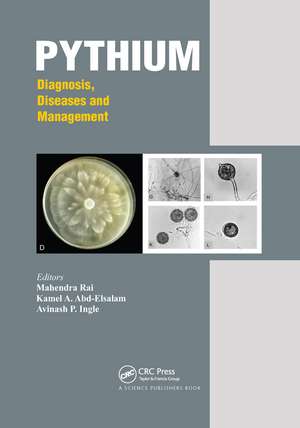Pythium: Diagnosis, Diseases and Management
Editat de Mahendra Rai, Kamel Ahmed Abd-Elsalam, Avinash P. Ingleen Limba Engleză Paperback – 30 sep 2021
Key Features
- Includes identification of Pythium spp. by traditional and molecular methods
- Deals with different diseases caused by Pythium spp
- Describes the role of Pythium in mammalian diseases
- Incorporates various management strategies
- Discusses emerging role of nanotechnological tools for the management of Pythium diseases
| Toate formatele și edițiile | Preț | Express |
|---|---|---|
| Paperback (1) | 445.57 lei 6-8 săpt. | |
| CRC Press – 30 sep 2021 | 445.57 lei 6-8 săpt. | |
| Hardback (1) | 1051.79 lei 6-8 săpt. | |
| CRC Press – 24 ian 2020 | 1051.79 lei 6-8 săpt. |
Preț: 445.57 lei
Nou
Puncte Express: 668
Preț estimativ în valută:
85.27€ • 87.32$ • 70.93£
85.27€ • 87.32$ • 70.93£
Carte tipărită la comandă
Livrare economică 19 martie-02 aprilie
Preluare comenzi: 021 569.72.76
Specificații
ISBN-13: 9781032175553
ISBN-10: 1032175559
Pagini: 392
Ilustrații: 8 Illustrations, color; 53 Illustrations, black and white
Dimensiuni: 178 x 254 x 21 mm
Greutate: 0.68 kg
Ediția:1
Editura: CRC Press
Colecția CRC Press
Locul publicării:Boca Raton, United States
ISBN-10: 1032175559
Pagini: 392
Ilustrații: 8 Illustrations, color; 53 Illustrations, black and white
Dimensiuni: 178 x 254 x 21 mm
Greutate: 0.68 kg
Ediția:1
Editura: CRC Press
Colecția CRC Press
Locul publicării:Boca Raton, United States
Cuprins
The Genus Pythium: An Overview. The Genus Pythium in Three Different Continents. Pythium: Diseases and Their Management. The Genus Phytopythium. The Top Three Plant Pathogenic Pythium Species. Pythium Species Associated with Die-back Apple Trees and Citrus gummosis in Tunisia. Pathogenic and Beneficial Pythium Species in China: An Updated Review. The Pythium Complex of the Mid-North Region of Brazil. Pythium spp. on Vegetable Crops: Research Progress and Major Challenges. Host Plants and Specificity of the Genus Pythium. IDENTITY AND TAXONOMY. Taxonomic Challenges in the Genus Pythium. Diagnosis of Pythium by Classical and Molecular Approaches. AS A HUMAN PATHOGEN. Pythium insidiosum - An Emerging Mammalian Pathogen. MANAGEMENT OF DISEASES CAUSED BY PYTHIUM. Damping-off Caused by Pythium Species: Disease Profile and Management. The Genus Pythium: Genomics and Breeding for Resistance. Role of Phytochemicals in Plant Diseases Caused by Pythium. Pythium aphanidermatum and its Control Measures. Management of Pythium Diseases. Management of Pythium spp. by Arbuscular Mycorrhizal Fungi. Pythium Species as Biocontrol Agents.
Notă biografică
Mahendra Rai, Ph.D. is a Senior Professor and UGC-Basic Science Research Faculty Fellow at the Department of Biotechnology, Sant Gadge Baba Amravati University, Maharashtra, India. He was Visiting Scientist in University of Geneva, Debrecen University, Hungary; University of Campinas, Brazil; Nicolaus Copernicus University, Poland. VSB Technical University of Ostrava, Czech Republic, and National University of Rosario, Argentina. He has published more than 400 research papers in national and international journals. In addition, he has edited/authored more than 48 books and 6 patents.
Kamel Abd-Elsalam, Ph.D. is a head researcher at Plant Pathology Research Institute, Agricultural Research Center, Giza, Egypt. Dr. Kamel’s research interests include molecular plant pathology and developing eco-friendly hybrid nanomaterials for controlling plant diseases. He has published, 4 books, and more than 120 research articles.
Dr. Kamel served as visiting scholar in Institute of Excellence in Fungal Research, Thailand, Institute of Microbiology, TUM, Germany, Laboratory of Phytopathology, Wageningen University, The Netherlands and Plant Protection Department, Sassari University, Italy.
Dr. Avinash P. Ingle has completed his doctoral degree from Department of Biotechnology, Sant Gadge Baba Amravati University, Amravati, Maharashtra (India). He had worked as Research Scientist in the same department from 2013-2016. He has more than 65 research publications, 38 book chapters and 3 books to his credit. He has been awarded travel grants from different funding agencies to present his research work in international conferences held at Malaysia, China, Spain and France. Currently, Dr. Ingle is working as Post-Doctoral Fellow at Department of Biotechnology, Engineering School of Lorena -University of São Paulo, Brazil and area of his research interest include plant pathology, nanobiotechnology and biofuel production.
Kamel Abd-Elsalam, Ph.D. is a head researcher at Plant Pathology Research Institute, Agricultural Research Center, Giza, Egypt. Dr. Kamel’s research interests include molecular plant pathology and developing eco-friendly hybrid nanomaterials for controlling plant diseases. He has published, 4 books, and more than 120 research articles.
Dr. Kamel served as visiting scholar in Institute of Excellence in Fungal Research, Thailand, Institute of Microbiology, TUM, Germany, Laboratory of Phytopathology, Wageningen University, The Netherlands and Plant Protection Department, Sassari University, Italy.
Dr. Avinash P. Ingle has completed his doctoral degree from Department of Biotechnology, Sant Gadge Baba Amravati University, Amravati, Maharashtra (India). He had worked as Research Scientist in the same department from 2013-2016. He has more than 65 research publications, 38 book chapters and 3 books to his credit. He has been awarded travel grants from different funding agencies to present his research work in international conferences held at Malaysia, China, Spain and France. Currently, Dr. Ingle is working as Post-Doctoral Fellow at Department of Biotechnology, Engineering School of Lorena -University of São Paulo, Brazil and area of his research interest include plant pathology, nanobiotechnology and biofuel production.
Descriere
This book focuses on almost all the major concerns associated with the genus Pythium, which mainly include history and phytopathogenesis, detection and diagnosis of Pythium, Pythium as human pathogen and effective and ecofriendly management of Pythium. The book is of great interest to plant pathologists, agricultural scientists, mycologists.
